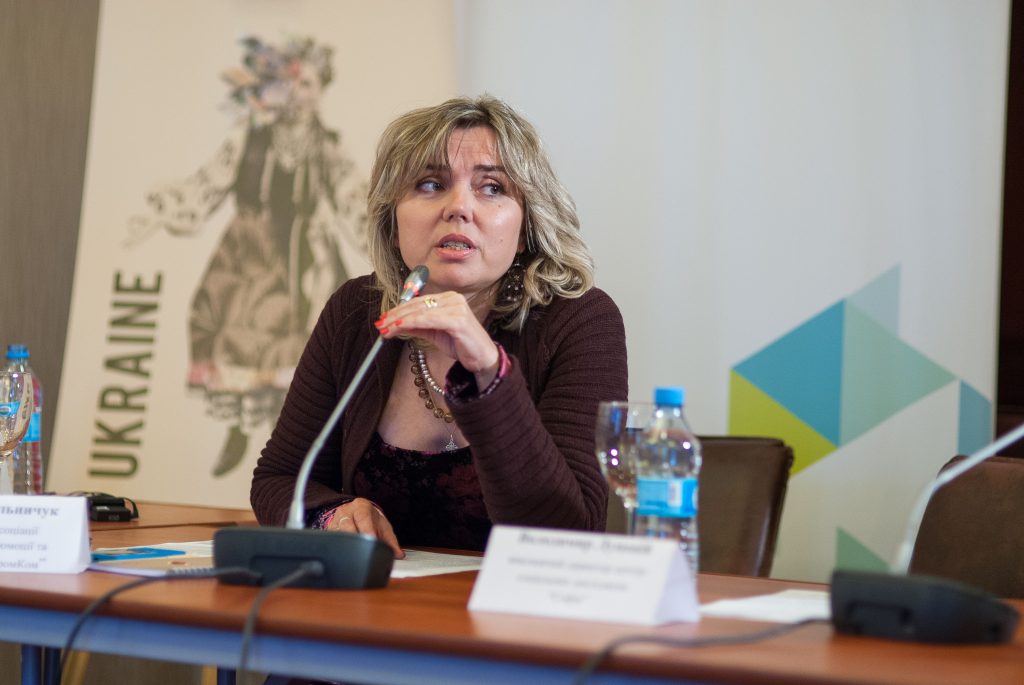Kyiv, September 29, 2014 – Donetsk and Kyiv intellectuals gathered in the Ukraine Crisis Media Center to discuss the vision of Donbas’ future. Speakers, including Donetsk University professors, business leaders, and activists of pro-Ukrainian movement in Donetsk had to leave the city. The most important issue for the future of the region, according to the speakers, is the question of the identity of the Donbas, its “de-sovietization” and “de-lumpenization”.
The speakers stressed that the very title of Donbas is the result of Soviet propaganda that has created an image of the region as hard, working class region, which forms much of the identity and the external perception of the land. As noted by Olena Stiazhkina, History Professor at Donetsk National University, such discourse turns Donbas into a ghetto, setting the region apart from other regions of Ukraine. “From my perspective, when we speak of Donbas, begin to analyze developments in the Donbas, we are faced with the problem of “ghettoization” of the region, she said. “It is believed that a region is inhabited by fools run by bandits.” As a result, Donbas is heavily stigmatized, as is evident in the reviews of this region offered by other regions of Ukraine. It should be reminded that Donbas is a product of the early Soviet policy, artificially created to highlight the economic specification of the region, which has nothing to do with its historical identity.
According to the famous Donetsk philosopher Gennadiy Fisun, today one can witness the end of Donbas history and the beginning Azov-Donetsk. Ukraine needs to develop a new political vocabulary.
Today’s conflict in eastern Ukraine is, in fact, a fight with the old moribund system; it is a separation from the Soviet-Russian system. Ukraine and the Azov-Donetsk in particular have to overcome the crisis of perspective. Ukraine’s information product should become a top priority of the state.
The main two questions of modern Ukraine are: Who are we? And where are we going?
The fact the majority of local people want to live in a united Ukraine is an important piece of information. According to the April poll, “nearly two-thirds of [residents] are in favor of the Ukrainian state and Ukrainian life,” said Professor Volodymyr Kipen, director of the Donetsk Institute for Social Research and Policy Analysis. This fact is very important for assessing the current situation in the Donetsk and Luhansk regions.
At the moment the Eastern Space is undergoing a so-called “fierce seize-fire”, during which militants threatened the humanitarian space of Ukraine, the Ukrainian tomorrow. This threat is challenging Ukrainian statehood.
Speakers stressed the need to glance into the future and create the correct humanitarian policy for the region. Gaps in humanitarian policy in the past have led to today’s problems, including regionalism and separatism in the region, dangerous militant “lumpenization”. When the state neglects its humanitarian socio-cultural policy, this niche is filled by foreign agents of influence. We need to take important steps to make the economy of Azov-Donbas viable. These steps, however, are not possible without prior de-sovietization. The most important challenge is to leave behind the old Soviet model of development and choose modernity instead.
According to Vira Nanivska, representative of a leading think tank in Ukraine, the question of renovation and modernization of Donetsk region has to expend to the key policy areas of Ukraine.
The expert panel featured Volodymyr Polevyi, National Security and Defence Council Information Center; Oleh Saakian, “United coordination center Donbas, “Eastern Space” intellectual initiative; Gennadiy Fisun, media-philosopher, “Eastern Space” intellectual initiative; Olena Stiazhkina, Doctor of historical sciences, Professor of history of Slavs, Donetsk National University; Volodymyr Kipen, Doctor of philosophy, “DISPRA” head; Vira Nanivska, Honorary President of the International Center for Policy Studies; Volodymyr Lupatsiy, executive director, Center for social studies “Sofia”; Oksana Melnychuk, President of Association of international promotion and communication “PromCom”.




